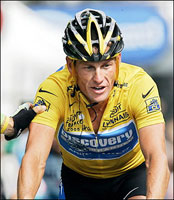World champion speaks out against Iraq war
By
Monica Moorehead
Published Aug 2, 2005 10:14 PM
Whether they follow sports or don't, millions of people around the world know of the extraordinary accomplishments of Lance Armstrong. He is the U.S. cyclist who recently won his record-setting seventh consecutive Tour de France championship.
There is something even more significant that Armstrong has done, but the commercial media continue to downplay it. He has become an outspoken critic of the Iraq war.
At the beginning of the war in 2003, Armstrong publicly raised his doubts about it, citing that the U.S. did not have the backing of certain European allies or the United Nations. Nevertheless, while distancing himself from George W. Bush regarding the Iraq war, he remained the president's friend; Armstrong comes from Texas.
Two years later, with more than 100,000 Iraqis and 1,800 U.S. troops dead, Armstrong has come out stronger against this war. Following his recent cycling victory, Armstrong had this to say: "The biggest downside to a war in Iraq is what you could do with that money. What does a war in Iraq cost a week? A billion? Maybe a billion a day? The budget for the National Cancer Institute is four billion. That has to change. Polls say people are much more afraid of cancer than of a plane flying into their house or a bomb or any other form of terrorism." (edgeofsports, July 26)
Armstrong has also come out in support of women's right to choose and for the separation of church and state. Some credit the influence of his life-partner, rock singer Cheryl Crow, for him taking a progressive stance on these issues.
Being a great athlete is not enough
Armstrong is admired by millions of people around the world and for good reasons. The Tour de France is arguably the most challenging of all individual sports. It has the largest number of participants than any other professional sport in the world--200 cyclists. The event is carried out in stages over a week's time. Each cyclist has to travel a certain amount of miles each day, which is recorded by Tour officials. The athlete who reaches 2,500 miles--including cycling up and down mountainous terrain--in the shortest amount of time is the winner.
To win this kind of race once is astonishing, but to win it seven times in a row is unbelievable. And what makes Armstrong's achievement even more amazing is that he was not expected to live before his first Tour de France victory. He had been diagnosed with testicular cancer. Somehow, he did beat the odds through treatment following the removal of the cancerous growth.
Armstrong has been an inspiration to millions of cancer survivors. He has been a major spokesperson in raising money to find a cure for the deadly disease.
Armstrong, along with Steve Nash, the 2005 National Basketball Association's Most Valuable Player, are the two most recognizable athletes who have spoken against the Iraq war. While this is admirable, it is now time for their actions to speak louder than their words.
They can take a lesson from Muhammad Ali, another great athlete and political activist. Ali not only spoke out against the Vietnam war in 1967 but came out into the streets to protest. He made a great sacrifice for this principled stance when his heavyweight title was taken away from him for almost four years.
Armstrong and Nash have the opportunity of taking that great leap to political activism by making a commitment to come to Washington, D.C., on Sept. 24 for the national march and rally against war and occupation.
Articles copyright 1995-2012 Workers World.
Verbatim copying and distribution of this entire article is permitted in any medium without royalty provided this notice is preserved.
Workers World, 55 W. 17 St., NY, NY 10011
Email:
[email protected]
Subscribe
[email protected]
Support independent news
DONATE


